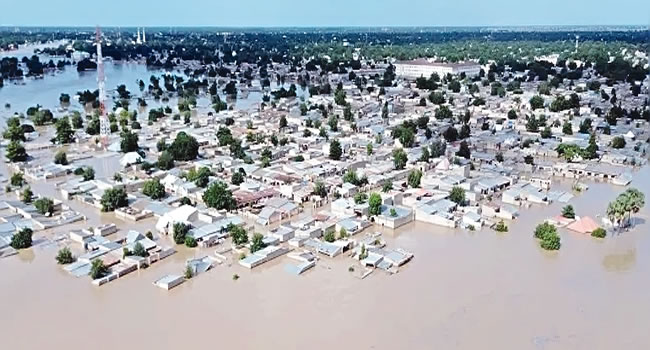The collapse of the Alau Dam in Maiduguri and the consequential flooding that has occurred in the city is a disaster on so many fronts. Scores of lives have been lost and counting. Several family members remain trapped or unaccounted for, with nearly two million displaced persons. This is a tragedy on a monumental scale. Several heart-breaking stories are coming out that depict the scale of the losses and trauma that the entire city and its people are going through.
Imagine going to bed at night and waking up to your entire house, belongings, valuables, cars completely submerged. Salvaging anything was simply unthinkable, other than attaining safety. A woman narrated how she woke up at 1am to the sound of water in her home and had to shout for help to be rescued with her children. Some simply managed to climb to the roof of their houses and wait to be rescued.

Those who managed to be rescued suddenly found themselves in a situation where they were rendered homeless with no single possession or household item, no food or clothes – other than what they had on their backs. The scale of loss is better imagined than experienced. Thus, many have now sought shelter with friends and families whose areas were not affected. The hosting households are also stretched to breaking point due to scarcity of food, relief materials, clean water, sanitary facilities and so on.
In addition to the foregoing, several thousands are still searching for loved ones and remain unsure where they are – if they made it alive or if it is their dead bodies that will be recovered. The uncertainty, worry, anxiety and trauma are unprecedented. Many are simply in a state of shock and disbelief, while others are just overwhelmed. The psychological trauma is immense.
Psychological trauma
Trauma is derived from the Greek word for ‘wound’. Psychological trauma occurs when we are exposed to extraordinarily stressful events that shatter our sense of security, making one feel helpless in a dangerous or life-threatening situations. Such situations result in a psychological wound or injury as a result of the traumatic experiences that threaten life or safety. It is often accompanied by difficulty with coping or functioning normally especially after a severe event or experience. Everyone’s reaction is different, but a majority of those who experience a potentially traumatic event will recover well with the support of family and friends and will not experience any long-term problems.
What is the psychological impact of disasters?
The diverse spectrum of emotional reactions in the aftermath of disasters usually vary from person to person. But they can be categorised broadly into two:
Emotional reactions: These include feelings of confusion and disbelief, with questions such as ‘why did this happen to me?’. Shock, denial, anger, anxiety, feelings of guilt and so on. Others may experience shame, feelings of sadness, hopelessness, social withdrawal from society, feeling like a burden, loss of sense of personal dignity and feeling vulnerable and at the mercy of the goodwill of others.
Physical symptoms: May include difficulty falling asleep, or having recurrent nightmares, fatigue and tiredness, muscle tension, being on the edge and jumping easily at loud or sudden noises, racing heart beats and feeling numb.
These symptoms frequently last for some days and then subside. But some of these symptoms may persist for several months and then gradually fade away over time. The majority will benefit from psychosocial support as well as interventions and treatment.
What can we do?
- Safety, shelter, basic needs: The government and all well-wishers need to firstly guarantee safety, shelter and basic needs such as food, water, clothes and sanitation.
- Ensure personal dignity and privacy as best as possible: High achieving adults and successful individuals may suddenly become helpless and vulnerable. Paying attention to their sense of personal dignity and some privacy helps to restore some of their self-confidence.
- Medical care: Several may have suffered physical injuries or infections and may need comprehensive medical checkup and treatment.
- Psychosocial support: The range of adverse and often traumatic experiences that the survivors have gone through is likely to leave emotional scars that may be deep-seated. They may also be going through emotional turmoil; as well as symptoms of post-traumatic stress disorder (PTSD) and so on.
Family members too – may also be held by guilt and a sense of failure that they were helpless and could not protect their loved ones….especially where they have lost a child or spouse or sibling or relative that they could not save in the floods. Thus, the entire family and loved ones may require psychosocial support to navigate all of their uncertainties and worries.
The Asido Foundation (www.asidofoundation.com) is joining hands with the Federal Neuropsychiatric Hospital (FNPH) Maiduguri and the Centre for Health Ethics, Law and Development (CHELD) to provide Mental Health and Psycho-Social Support (MHPSS) to affected persons in Maiduguri. All stakeholders and all hands need to be on deck – Disasters are not for governments alone to handle.
Read Also: Lagos govt partners FG, private sector to boost tourism







